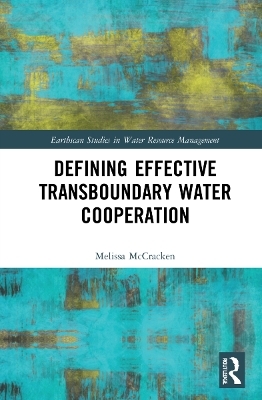
Defining Effective Transboundary Water Cooperation
Routledge (Verlag)
978-0-367-64780-3 (ISBN)
With the increasing focus on transboundary cooperation as a part of the Sustainable Development Goal Framework, there is global recognition of transboundary water cooperation as a tool for improved governance and management of transboundary surface and groundwaters. However, there is not an agreed upon definition of transboundary water cooperation in the literature or in practice. This book develops the Four Frames of Transboundary Water Cooperation, which is a neutral modular framework for developing context-specific explanatory definitions of transboundary water cooperation in basins and aquifers. The Four Frames of Cooperation are legal, institutional, relational, and outcome. However, we need to move beyond defining cooperation to understand better measures of the quality and effectiveness of cooperative processes. The Weighted Model of Effective Cooperation presents a first step in qualitatively evaluating the effectiveness of transboundary water cooperation. This model defines effective transboundary water cooperation and operationalizes a method to evaluate the effectiveness of cooperative processes over internationally shared waters. Effective cooperation emphasizes the relational and outcome frames of cooperation while working towards equitability and sustainability. Together, the Four Frames of Cooperation and the Weighted Model of Effective Cooperation will improve the understanding of cooperation and encourage a detailed evaluation of the quality, success, and effectiveness of cooperative processes.
This book will be of great interest to students and scholars of water resource management, water governance, and environmental politics. It will also appeal to policymakers and professionals working in the fields of water conflict, water diplomacy, and international cooperation.
Melissa McCracken is an Assistant Professor of International Environmental Policy at The Fletcher School at Tufts University. Her research focus is on international water policy and management, cooperation and conflict over shared surface and groundwaters, and conflict transformation surrounding environmental resources. Prior to joining The Fletcher School, Melissa was a Post-Doctoral Scholar with the Program in Water Conflict Management and Transformation, as well as the Manager of the Transboundary Freshwater Dispute Database housed at Oregon State University.
1. Using a common language for transboundary waters Part 1: Why is a consistent definition to measure transboundary water cooperation needed? 2. Presenting the two challenges: Defining transboundary water cooperation and measuring its effectiveness 3. Demonstrating the challenges: SDG Indicator 6.5.2 – Measuring operational arrangements for transboundary water cooperation Part II: Challenge 1: How is transboundary water cooperation defined? 4. A lack of consensus in defining transboundary water cooperation 5. Similar terms: Teasing out definitions of transboundary water cooperation 6. Framing transboundary water cooperation: A framework definition Part III: Challenge 2: What makes transboundary water cooperation effective? 7. Murky waters: Trying to define effectiveness for transboundary water cooperation 8. Unpacking effectiveness: Developing a definition of effective transboundary water cooperation 9. Evaluating effective transboundary water cooperation: A model for effectiveness 10. A path forward for effective cooperation over transboundary waters Appendices
| Erscheinungsdatum | 01.04.2022 |
|---|---|
| Reihe/Serie | Earthscan Studies in Water Resource Management |
| Zusatzinfo | 25 Tables, black and white; 25 Line drawings, black and white; 12 Halftones, black and white; 37 Illustrations, black and white |
| Verlagsort | London |
| Sprache | englisch |
| Maße | 156 x 234 mm |
| Gewicht | 489 g |
| Themenwelt | Naturwissenschaften ► Biologie ► Ökologie / Naturschutz |
| Sozialwissenschaften ► Politik / Verwaltung ► Europäische / Internationale Politik | |
| Technik ► Umwelttechnik / Biotechnologie | |
| ISBN-10 | 0-367-64780-X / 036764780X |
| ISBN-13 | 978-0-367-64780-3 / 9780367647803 |
| Zustand | Neuware |
| Informationen gemäß Produktsicherheitsverordnung (GPSR) | |
| Haben Sie eine Frage zum Produkt? |
aus dem Bereich


